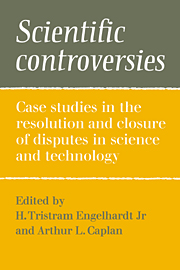 Scientific Controversies
Scientific Controversies Book contents
- Frontmatter
- Contents
- Preface
- List of contributors
- Introduction: Patterns of controversy and closure: the interplay of knowledge, values, and political forces
- PART I THEORETICAL PERSPECTIVES
- PART II CONTEMPORARY CASE STUDIES
- 12 Resolution of the Laetrile controversy: past attempts and future prospects
- 13 Federal regulation of Laetrile
- 14 Quasi libertarianism and the Laetrile controversy
- 15 Judicial deflection of scientific questions: pushing the Laetrile controversy toward medical closure
- 16 Politics, science, and the problem of psychiatric nomenclature: a case study of the American Psychiatric Association referendum on homosexuality
- 17 The diagnostic status of homosexuality in DSM-III: a reformulation of the issues
- 18 On arriving at the American Psychiatric Association decision on homosexuality
- 19 Values in the debate over workplace safety and health: the rancorous rhetoric about regulation
- 20 The successful experiment that failed
- 21 The power of efficiency: balancing benefits and costs in regulating occupational exposure to toxic substances
- 22 Closure in occupational safety and health: the benzene and cotton dust decisions
- 23 Nuclear fear: a history and an experiment
- 24 Closure and controversy: Three Mile Island
- 25 Understanding the nuclear power controversy
- PART III CONTROVERSY, CLOSURE, AND THE PUBLIC
- Author index
- Subject index
16 - Politics, science, and the problem of psychiatric nomenclature: a case study of the American Psychiatric Association referendum on homosexuality
Published online by Cambridge University Press: 03 February 2010
- Frontmatter
- Contents
- Preface
- List of contributors
- Introduction: Patterns of controversy and closure: the interplay of knowledge, values, and political forces
- PART I THEORETICAL PERSPECTIVES
- PART II CONTEMPORARY CASE STUDIES
- 12 Resolution of the Laetrile controversy: past attempts and future prospects
- 13 Federal regulation of Laetrile
- 14 Quasi libertarianism and the Laetrile controversy
- 15 Judicial deflection of scientific questions: pushing the Laetrile controversy toward medical closure
- 16 Politics, science, and the problem of psychiatric nomenclature: a case study of the American Psychiatric Association referendum on homosexuality
- 17 The diagnostic status of homosexuality in DSM-III: a reformulation of the issues
- 18 On arriving at the American Psychiatric Association decision on homosexuality
- 19 Values in the debate over workplace safety and health: the rancorous rhetoric about regulation
- 20 The successful experiment that failed
- 21 The power of efficiency: balancing benefits and costs in regulating occupational exposure to toxic substances
- 22 Closure in occupational safety and health: the benzene and cotton dust decisions
- 23 Nuclear fear: a history and an experiment
- 24 Closure and controversy: Three Mile Island
- 25 Understanding the nuclear power controversy
- PART III CONTROVERSY, CLOSURE, AND THE PUBLIC
- Author index
- Subject index
Summary
In 1973, after several years of bitter dispute, the board of trustees of the American Psychiatric Association (APA) decided to remove homosexuality from the Diagnostic and Statistical Manual of Psychiatric Disorders, its official list of mental diseases.
Infuriated by that action, dissident psychiatrists charged the leadership of their association with an unseemly capitulation to the threats and pressures of gay liberation groups and forced the board to submit its decision to a referendum of the full APA membership. And so America's psychiatrists were called to vote upon the question of whether homosexuality ought to be considered a mental disease. The entire process, from the first confrontations organized by gay demonstrators at psychiatric conventions to the referendum demanded by orthodox psychiatrists, seemed to violate the most basic expectations about how questions of science should be resolved. Instead of being engaged in a sober consideration of data, psychiatrists were swept up in a political controversy. The APA, according to its critics, had fallen victim to the disorder of a tumultuous era in which disruptive conflicts threatened to politicize every aspect of American social life. A furious egalitarianism, which challenged every form of authority, had compelled psychiatric experts to negotiate the pathological status of homosexuality with homosexuals themselves. The result was not a conclusion based on an approximation of the scientific truth as dictated by reason but an action demanded by the ideological temper of the times.
To those who viewed the 1973 decision sympathetically, psychiatry had displayed a remarkable capacity to acknowledge the significance of new research findings and to rethink its approach to sexuality.
- Type
- Chapter
- Information
- Scientific ControversiesCase Studies in the Resolution and Closure of Disputes in Science and Technology, pp. 381 - 400Publisher: Cambridge University PressPrint publication year: 1987
- 19
- Cited by
